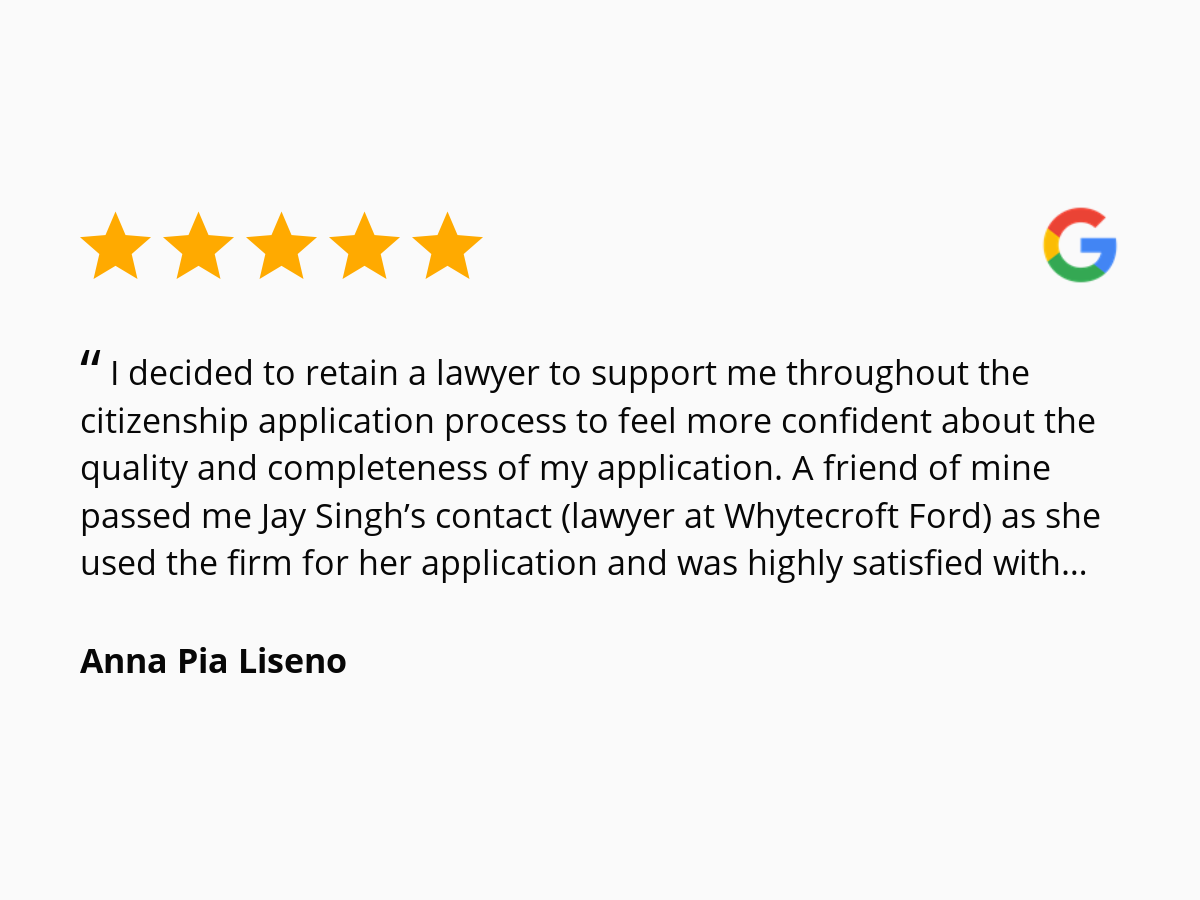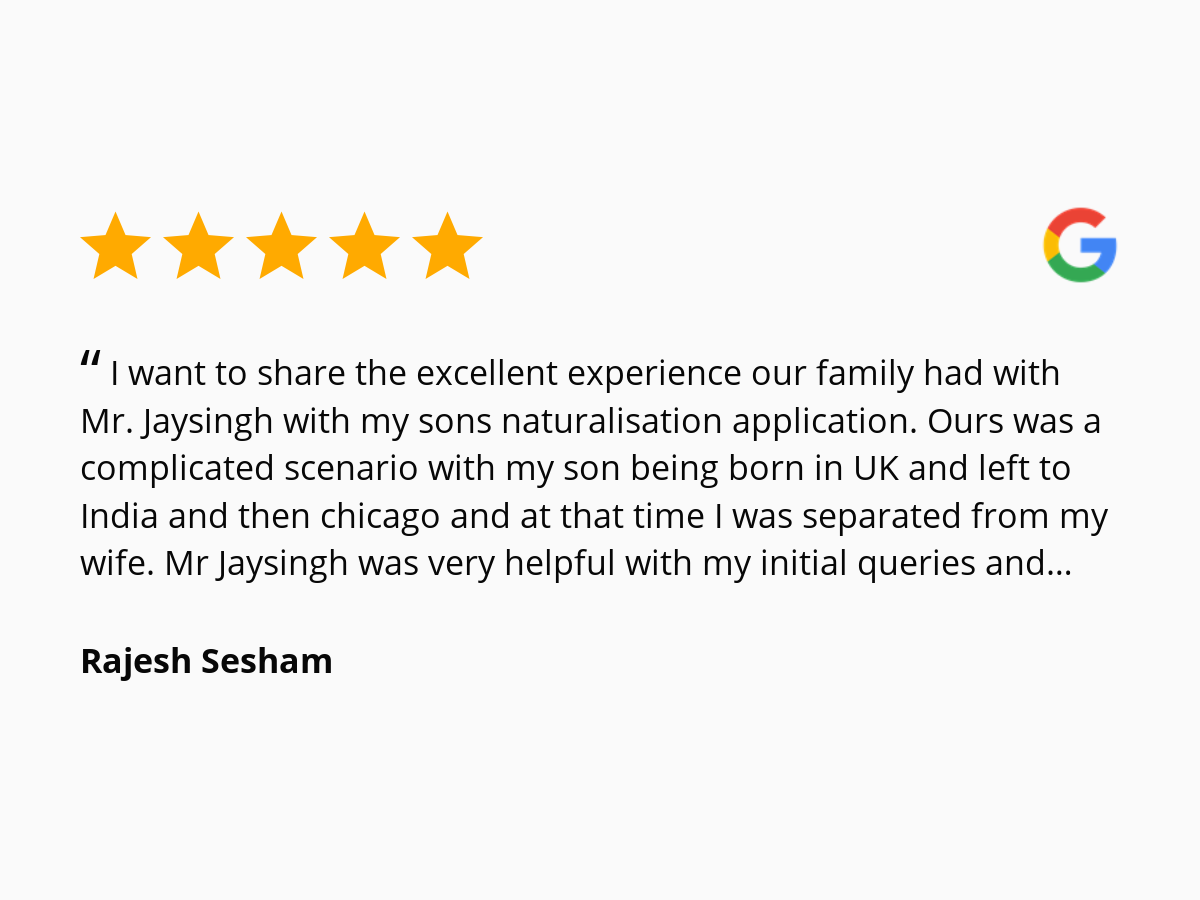British Citizenship by Naturalisation
Naturalisation refers to becoming a British citizen through lawful residence in the UK. The requirements for Naturalisation are specified under The British Nationality Act 1981.
Contact our team to find out how we can help you.
What is British Citizenship by Naturalisation?
Naturalisation is the most common way of obtaining British citizenship. Individuals may apply for naturalise as British citizens after lawfully residing here, subject to meeting other requirements. The citizenship ceremony is part of the naturalisation process, where you will be provided with a certificate after taking an oath to pledge allegiance to the United Kingdom.
Once naturalised, you can apply for a British passport and no longer be subject to immigration restrictions. Naturalised citizens can live and work freely in the UK and travel outside the country without restrictions.
You will not need to apply for Naturalisation if you are entitled to British Citizenship by automatic acquisition.
Apply for British Citizenship
The requirements for Naturalisation as a British Citizen are set out in law under section 6 (1) of the British Nationality Act 1981. You must:
- Be over 18 at the date of application
- Have lived in the UK for five years and meet the residence requirements
- Prove your knowledge of English, Welsh, or Scottish Gaelic
- Have sufficient knowledge of Life in the UK by passing the Life in the UK test
- Illustrate good character, meaning that you have not broken any UK laws
- Be of sound mind
- Be free from immigration time restrictions for at least 12 months
- Intend to make the UK your permanent home.
Different rules apply if you are married to a British citizen.
Naturalisation Residence Requirements
To meet the Naturalisation Residence Requirements, you must be able to prove five years of UK lawful residence leading up to your application. In addition, you will need to gather accurate travel details; If you are unsure about your travel history, our team can assist you.
Applicants who want to apply for Naturalisation as a British Citizen must also meet the residency requirements by demonstrating that they:
- Must have been physically in the UK precisely five years before the date the application
- Must not have been absent for more than 450 days during the five years leading up to the date of application
- Must not have been absent for more than 90 days during the twelve months leading up to the date of application
- Have held Permanent Residence or Indefinite Leave to Remain for at least 12 months.
When travelling abroad, applicants should keep a record of their absences from the UK, including departure and return dates, places visited, and purposes of visits. They should also retain their passports and any receipts issued during this time.
While there is a standard expectation that the residence requirements are met, the Home Office may exercise discretion and ignore absences in some circumstances.
Good Character Requirements
All criminal convictions, however minor, including spent convictions, must be declared. In addition, the British Nationality Act 1981 requires any person applying for Naturalisation as British citizenship to be of ‘good character’.
‘Good character’ is not defined in the Act, but Home Office guidance explains how the ‘good character’ requirement will be assessed. The good character requirement is aimed at ensuring that you have led a law-abiding life during your time in the United Kingdom and that you are also respectful of the rights and freedoms of the UK and will be a dutiful citizen. A person may be considered not to be of good character for various reasons. Considerations include
- criminal convictions
- cautions
- pending prosecutions
- unpaid fixed penalty notices that have been referred to a court for non-payment
- non-payment of income tax, VAT
- participation in war crimes, terrorism, etc.
- deception or unlawful behaviour concerning immigration matters.
The Life in the UK Test
To satisfy the Knowledge of Language and Life in the UK (KoLL) requirement for Naturalisation, you must pass the Life in the UK Test and demonstrate your knowledge of English at the required level.
The Life in the UK Test consists of questions about UK laws, the legal system, working and other details of Life in the UK. You can take the test any time before you apply. However, you do not need to take the test if you had already passed it (for example, when you applied for indefinite leave to remain) or are under 18 or over 65.
The test can be taken as many times as is needed to pass it, but a fee is payable each time, which is currently set at £50. There is an official handbook which also costs £50. You can also download an app to practice — search for the official Life in the UK Test. Some colleges offer short courses to help prepare for the test, although there will be a fee for this.
You must score at least 75% to pass. The test lasts 45 minutes, and there are 24 questions to answer. There are over 30 test centres in the UK, and you can choose the one closest to you when you book.
English Language Requirement
There are some exceptions when it comes to the English Language requirement for Naturalisation; applicants will need to either come from an English-speaking country as listed or have a degree taught in English.
The Home Office possesses the discretion to waive the language requirement where it would be unreasonable to expect the applicant to fulfil it because of age or physical or mental condition. The language requirement will usually be waived when the applicant is 65 or over. The grounds for exemption of younger people need to be compelling, such as where the applicant:
- is suffering from a long-term illness or disability which severely restricts mobility and ability to attend language classes
- suffers from a speech impediment which limits the ability to converse in the relevant language
- has a mental impairment, which means they cannot learn another language.
To prove that you have English-language ability in speaking and listening to a minimum level of B1 on the Common European Framework of Reference for Languages (CEFR). The language element can currently be met by providing specified evidence to confirm that you:
- are a national of a listed majority English-speaking country
- have provided an English-language qualification at a minimum level of B1 CEFR when applying for a previous grant of leave
- have obtained a degree that UK NARIC deems to be equivalent to a UK bachelor’s or master’s degree or PhD, and which was taught or researched in English
- have taken and passed an English-language test that meets or exceeds level B1 CEFR with a provider approved by the Home Office for this purpose.
British Naturalisation Application Documents
The applicant must prove their Naturalisation eligibility by supplying the appropriate documentation with their application; otherwise, risk a refusal. The documentary requirements for Naturalisation can include the following.
- Evidence of identity, such as a valid passport or a BRP card
- Evidence of English Language requirements, such as a level B1 CEFR certificate taken at a Home Office-approved test centre, or a UK degree certificate or proof of an exemption
- Life in the UK test certificate or reference number
- In the case of non-EU nationals, evidence of lawful residence five years before the date of the application, such as can be shown in your passport
- In the case of EU nationals, evidence of legal residence in the UK for the five years qualifying residence period
- Proof of Permanent Residence.
The specific documents required in your application will depend on your circumstances.
UK Naturalisation Application
Form AN, or its online equivalent, must be completed to apply for Naturalisation as a British citizen. In addition, the application must be endorsed by two referees, as explained below.
Referee Requirements for British Naturalisation Application
All applicants must provide referees for Naturalisation and verify their identity. It is also important to note that not everyone can be a referee for your citizenship application. Your proposed referee must meet the Home Office criteria, so you must know who is eligible to avoid any issues arising once your application is submitted.
At least one of them should be of professional standing from the list of Home Office-acceptable professions. Example professions include (but are not limited to): accountant, chemist, councillor (local or county), director of a VAT-registered company, journalist, member of parliament, police officer, social worker, solicitor or trade union official.
The second referee should be the holder of a British citizen passport and either a person of professional standing or over 25 years of age.
The referees must not be related to the applicant or each other. In addition, they must have known the applicant for at least three years and be willing to provide details of their knowledge of the applicant.
Citizenship Ceremony
The BNA 1981 provides that anyone over 18 who acquires British Citizenship, whether by Registration or Naturalisation, must do so at a public ceremony and take the Oath of Allegiance within three months of the application being granted.
If the applicant does not attend the ceremony within three months without an agreement from the decision maker to extend the period, they will need to re-apply for Naturalisation.
Citizenship ceremonies are organised by local authorities and are usually conducted in groups. However, if a private ceremony is desired or the applicant has special requirements, the local authority should be contacted and asked to accommodate such requests. An additional fee may be payable for a private ceremony.
A certificate of Naturalisation and a welcome pack will be presented to the newly naturalised British citizen. The package includes information on the status of a British citizen and on how to apply for a British passport.
What can I do if my application is refused?
There is no statutory right of appeal against a decision to refuse an application. However, you can request the Home Office UKVI to reconsider through a formal request using Form NR. A fee is payable for reconsideration and must be sent in with the application. If the refusal is reversed and the application is approved, the fee will be used to cover the cost of the citizenship ceremony, where applicable, or refunded. If the decision is maintained, the fee will be retained to cover the costs of reviewing the application.
British Naturalisation Processing Time
The Home Office’s published processing time for Naturalisation applications is up to six months. However, applications may take longer than six months in cases with a complex history.
Processing may also be delayed if there are outstanding enquiries that the decision maker has made while carrying out checks on the application. The decision maker may contact the applicant to request further information or an interview, which may delay processing. If an interview is requested, the applicant must be able to attend this without the assistance of an interpreter.
Usually, a well-prepared application may take up to 2-3 months to process. However, upon a successful application, you will be invited to book your citizenship ceremony within three months.
UK Naturalisation Fee
Effective from 10 April 2024, it costs £1,630 to apply; this includes £130 towards the citizenship ceremony fee.
There may be other costs depending on your situation, for example, the English language and Life in the UK test and document translations.
You will not need to pay the biometric fee whether you submit your biometric information in person or if you verify your identity and submit your application through the IDV app. However, you must be invited to use the app.
Children
Although a child under 18 cannot be naturalised, they may be eligible to apply for British Citizenship by Registration. In addition, a child born in the UK may be registered once their parent has received ILR.
There are specific eligibility criteria for British Registration for children. However, children registering as British citizens are not required to demonstrate their knowledge of English and pass the Life in the UK Test. A child who reaches the age of 18 must meet the requirements for Naturalisation as a British citizen, including the KOLL requirement.
Benefits of British Naturalisation
The main benefits are that you can apply for a British passport and live and work freely in the UK without immigration restrictions.
Any future children would be British citizens, and children born outside the UK would also be British (by descent).
In addition, as a British national, you would have access to consular assistance abroad from British consulates and high commissions. However, individuals holding dual citizenship should be aware of the Master Nationality Rule.
Factors to consider when applying for Naturalisation
Before commencing the application process, you should check whether obtaining British citizenship will affect your current citizenship. The UK allows dual citizenship; however, some countries, such as India, do not allow one person to hold other nationalities.
Acquiring British citizenship can affect your tax position and, if relevant, that of your spouse and children.
You should contact the government of the country of your current citizenship to check whether you may lose your current citizenship upon obtaining British citizenship or if there are any procedural steps you must take to retain your current citizenship.
Frequently asked questions
What does it mean to be free from “immigration time restrictions”?
You can make a Naturalisation application if you have lived in the UK for 12 months as a settled person and are free from immigration restrictions; in other words, you must hold Indefinite Leave to Remain or settle in the UK for one year before applying for Citizenship.
Can I get British Citizenship if my grandparents are British?
If you are British by descent, you may be able to register as a British, but otherwise, you must apply for Naturalisation.
Is the fee refunded if a Naturalisation application is refused?
Unfortunately, the fee will not be refunded in case an application is refused for any reason.
Can I travel outside the UK during the application process?
Yes, unlike applications for permission to stay in the UK, travel once an application to become a British citizen by Naturalisation has been submitted is permitted.
Can EU nationals and their family members apply to become British Citizens by Naturalisation?
Yes, EU nationals and their family members who have Settled Status can apply to naturalise as a British citizen in the same way as non-EU nationals.
Take Your Next Step
Ready to take the next step in your immigration journey? Contact us for a free assessment, consultation, application check, or representation.
Our expert team has the knowledge and experience to guide you through the process and achieve your immigration goals.
Why Choose Whytecroft Ford For Your Immigration Application?
Free 15-Minute Assessment
We offer a 15 minutes free immigration advice UK session to assess your eligibility for an immigration application. We can then advise you on the best course of action.
No Hidden Charges & Fixed Fees
We will clearly outline all fees associated with your application so that you can make an informed decision. There are no surprises during the application process.
Highly Rated Services
Whytecroft Ford has a long-standing reputation as an Excellent immigration firm. Our Immigration services are highly rated on Trustpilot and Google.
IAA Approved
We are regulated to a high service standard by the Immigration Advice Authority, UK, assuring our clients that we offer a quality service.
Secure Remote Services
We use secure technology to process your UK Immigration Application. Our remote services mean you can easily access our team from the comfort of your own home.
Experienced Professionals
Our expert immigration advisors have many years of experience and have successfully assisted individuals and families to migrate and live in the UK.
Clear, Professional UK Immigration Advice Made Simple
Our friendly and professional team is dedicated to providing clear and concise advice for your UK immigration application through a no-obligation assessment. During this assessment, we will evaluate your options for obtaining, extending, or switching into a specific UK immigration category. We will also identify the strengths and potential challenges in your circumstances, offering tailored guidance to help you navigate the next steps with confidence.
Ready to get started? Contact us today:
-
- Fill out our contact form
- Call us at +44 (0)20 8757 5751
- Email us at info@whytecroftford.co












